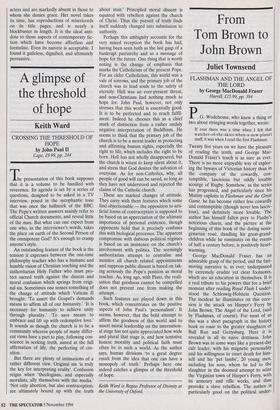A glimpse of the threshold of hope
Keith Ward
CROSSING THE THRESHOLD OF HOPE by John Paul II Cape, £9.99, pp. 244 he presentation of this book supposes that it is a volume to be handled with reverence. Its agenda is set by a series of questions, designed to be asked in a TV interview, posed in the sycophantic tone that was once the hallmark of the BBC. The Pope's written answers mainly refer to official Church documents, and reveal little of the man. But what can one expect from one who, in the interviewer's words, takes the place on earth of the Second Person of the omnipotent God? It's enough to cramp anyone's style.
An outstanding feature of the book is the tension it expresses between the one-time philosophy teacher who has a humane and humble vision of Christian teaching and the authoritarian Holy Father who must pro- tect sacred truth against the dissent and moral confusion which springs from origi- nal sin. Sometimes one senses something of the change of attitude which Vatican II brought: `To assert the Gospel's demands means to affirm all of our humanity.' It is necessary for humanity to achieve unity through plurality.' To save means to embrace and lift up with redemptive love.' It sounds as though the church is to be a community wherein people of many differ- ent views have a part to play, following con- science in seeking truth, aimed at the full affirmation of life, the perfecting of cre- ation.
But there are plenty of intimations of a rather different view. Original sin `is truly the key for interpreting reality'. Confusion reigns when `theologians, and especially moralists, ally themselves with the media.' `Not only abortion, but also contraception, are ultimately bound up with the truth about man.' Principled moral dissent is equated with rebellion against the church of Christ. Thus the pursuit of truth finds itself suddenly changed into submission to authority.
Perhaps this ambiguity accounts for the very mixed reception the book has had, having been seen both as the last gasp of a bankrupt patriarchy and as a message of hope for the future. One thing that is worth noting is the change of emphasis that marks the Catholicism of the present Pope. For an older Catholicism, this world was a vale of sorrows, and the primary job of the church was to lead souls to the safety of eternity. Hell was an ever-present threat, and non-Christians had nothing much to hope for. John Paul, however, not only stresses that this world is essentially good. It is to be perfected and to reach fulfil- ment. Indeed he chooses this as a chief mark of distinction from a rather unduly negative interpretation of Buddhism. He seems to think that the primary job of the church is to be a moral leader in protecting and affirming human rights, especially the right to life, which includes the right to be born. Hell has not wholly disappeared, but the church is wisest to keep silent about it, and stress that God desires the salvation of everyone. As for non-Catholics, why, all people of good will can be saved, as long as they have not understood and rejected the claims of the Catholic church.
These are marked changes of attitude. They carry with them features which some find objectionable — the opposition to arti- ficial forms of contraception is supposed to be based on an appreciation of the ultimate importance of personal existence, though opponents hold that it precisely confuses this with biological processes. The apparent compromise with dubious political regimes is based on an insistence on the church's involvement with politics. The seemingly authoritarian attempt to centralise and monitor all church related appointments and suppress public dissent is based on tak- ing seriously the Pope's position as moral teacher. As, long ago, with Plato, the reali- sation that goodness cannot be compelled does not prevent one from making the attempt.
Such features are played down in this book, which concentrates on the positive aspects of John Paul's `personalism'. It seems, however, that the bold attempt to affirm the goodness of this world and to assert moral leadership on the internation- al stage has not quite appreciated how wide and plural that stage is, and how tentative honest morality and political faith must often be in such a world. As the author says, human divisions `to a great degree result from the idea that one can have a monopoly of truth.' Perhaps here one indeed catches a glimpse of the threshold of hope.
Keith Ward is Regius Professor of Divinity at the University of Oxford.










































































 Previous page
Previous page